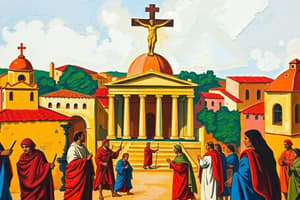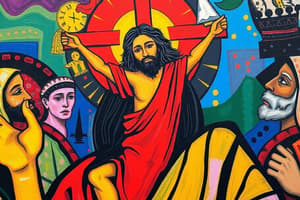Podcast
Questions and Answers
What was the primary reason the Romans banned certain religions?
What was the primary reason the Romans banned certain religions?
- They posed political challenges to Roman authority. (correct)
- They found them incompatible with Roman traditions.
- They led to significant social unrest.
- They were considered financially burdensome.
What significant event did Emperor Hadrian carry out in 135?
What significant event did Emperor Hadrian carry out in 135?
- Established Christianity as the official religion.
- Legalized all forms of worship within the empire.
- Completed the construction of the Colosseum.
- Destroyed Jerusalem and expelled the Jewish people. (correct)
How is Jesus of Nazareth viewed in Christianity?
How is Jesus of Nazareth viewed in Christianity?
- As the Jewish Messiah and God's Anointed one. (correct)
- As the primary apostle of Paul of Tarsus.
- As a philosopher with no divine connection.
- As a political rebel against Roman authority.
What is the structure of the Christian Bible?
What is the structure of the Christian Bible?
What was Jesus' primary message during his teachings?
What was Jesus' primary message during his teachings?
Who is recognized as the most important figure in spreading Christianity after Jesus' death?
Who is recognized as the most important figure in spreading Christianity after Jesus' death?
How did the Roman emperors generally react to the growth of Christianity?
How did the Roman emperors generally react to the growth of Christianity?
What event is known as the Resurrection in Christianity?
What event is known as the Resurrection in Christianity?
What was the relationship between Judaism and early Christianity?
What was the relationship between Judaism and early Christianity?
What was the fate of Christians after Emperor Constantine converted to Christianity?
What was the fate of Christians after Emperor Constantine converted to Christianity?
Flashcards
Roman Religious Tolerance
Roman Religious Tolerance
The Roman Empire generally allowed freedom of worship and adopted many religious practices from conquered cultures, but they banned or restricted certain religions when they posed a political threat.
Roman Religious Syncretism
Roman Religious Syncretism
The Romans' tolerance of religious practices allowed many diverse beliefs to flourish within the empire, including the adoption of Greek Olympian gods, though they were given different names.
Roman Suppression of Judaism
Roman Suppression of Judaism
Judaism was allowed in the Roman Empire until Jewish revolts threatened Roman control. Emperor Hadrian suppressed the revolts, destroyed Jerusalem, and restricted Jewish access to the city.
Political Threat & Religious Restrictions
Political Threat & Religious Restrictions
Signup and view all the flashcards
Emergence of Christianity
Emergence of Christianity
Signup and view all the flashcards
Christian Belief in the Messiah
Christian Belief in the Messiah
Signup and view all the flashcards
The Christian Bible
The Christian Bible
Signup and view all the flashcards
Jesus's Birth and Divinity
Jesus's Birth and Divinity
Signup and view all the flashcards
Jesus' Death and Resurrection
Jesus' Death and Resurrection
Signup and view all the flashcards
The Apostles and Paul of Tarsus
The Apostles and Paul of Tarsus
Signup and view all the flashcards
Study Notes
Roman Empire and Religion
- Roman religious beliefs did not impose on conquered peoples.
- Freedom of worship was often granted.
- Roman beliefs sometimes adopted Greek gods, but with different names.
- Judaism was not banned but the Romans destroyed Jerusalem in 135 CE, forbidding Jews from the city.
Christianity's Origins
- Christianity arose in Judea, based on teachings and life of Jesus of Nazareth.
- Jesus was seen as the Messiah, a descendant of King David, and "God's anointed one."
- Christianity grew from Jewish traditions and beliefs.
- The Christian Bible consists of two parts: the Old Testament (similar to the Hebrew Bible) and the New Testament (accounts of Jesus's life and early Christianity).
- Christians believe Jesus was born in Bethlehem.
- Jesus's teachings challenged Roman authority.
- Jesus was crucified, and Christians consider his resurrection three days later.
- Early followers (apostles) were trained by Jesus; Paul of Tarsus was crucial in spreading Christianity.
Growth of Christianity
- Christianity spread despite opposition and persecution.
- Roman emperors sometimes feared the growing religion.
- Emperor Constantine eventually adopted Christianity, making it the official religion of Rome.
Studying That Suits You
Use AI to generate personalized quizzes and flashcards to suit your learning preferences.




